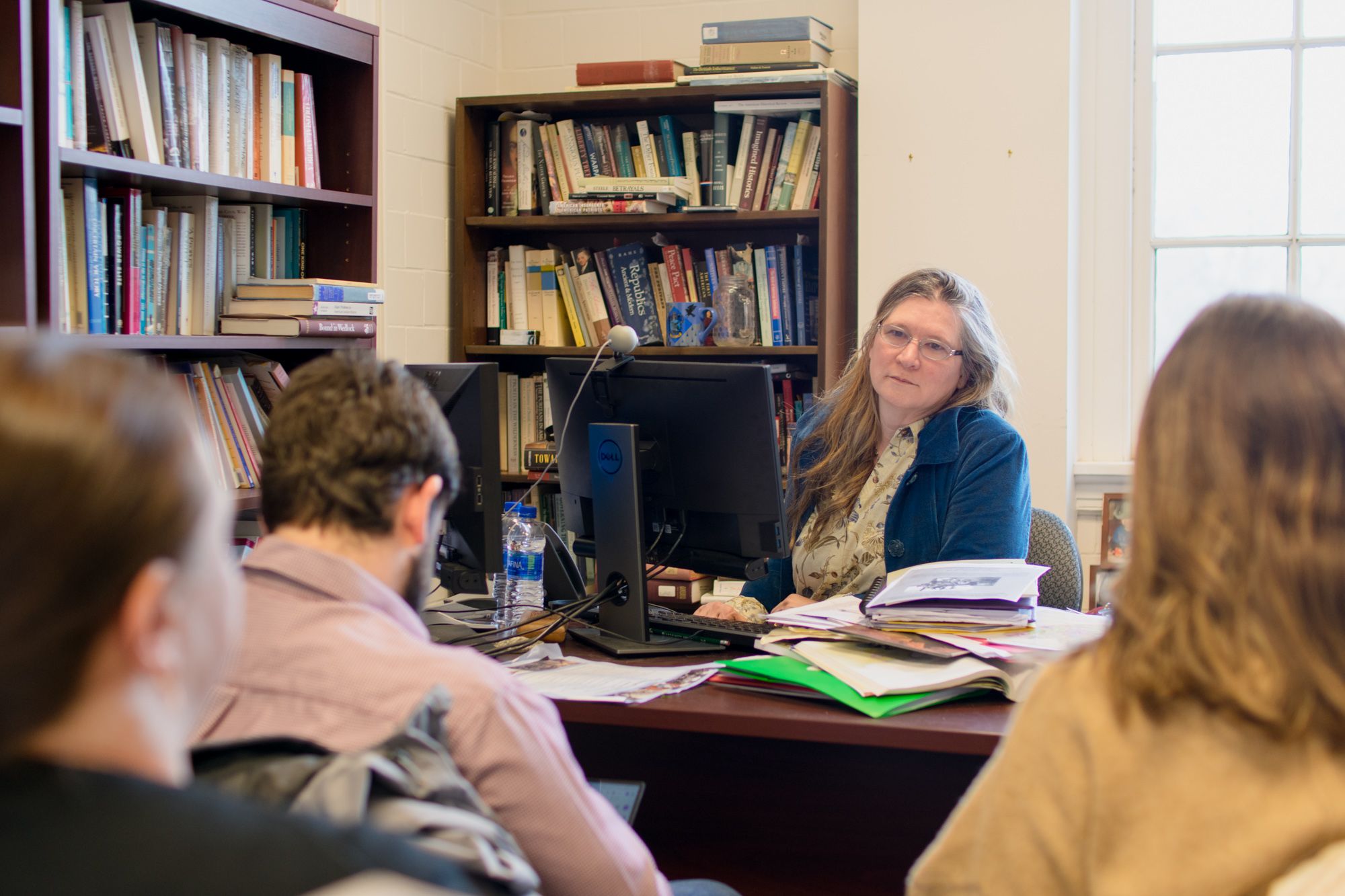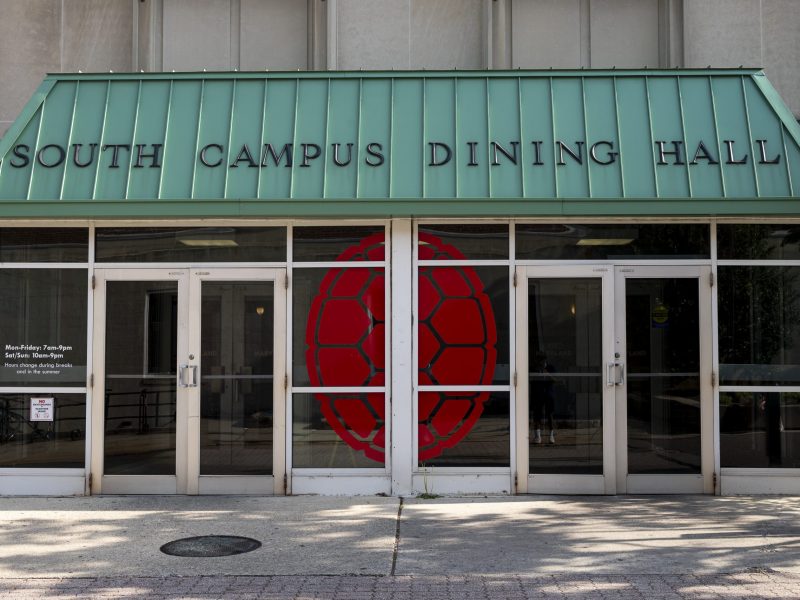Holly Brewer, a history professor at the University of Maryland, was hoping to spend this semester on sabbatical — putting the finishing touches on the book she’s been working on for more than 10 years.
But her plans changed in the fall when funding fell through.
In September, dean Steve Fetter announced that the graduate school was changing the eligibility requirements for the faculty Research and Scholarship Awards, an internal grant program. The graduate school gives priority for RASA’s $10,000 grants to the humanities and other disciplines that, unlike STEM-based fields, have limited opportunities for outside sponsorship.
Under the new guidelines, the grant now requires faculty members who apply to directly involve graduate students in their research or scholarship. This can be impractical for activities that are typically conducted individually, such as writing a book.
Brewer had intended for the grant to pay for her department to release her from teaching for a semester. But because her work wouldn’t involve any grad students, she wasn’t eligible for funding under the new grant requirements.
“For the sciences, [$10,000] is just chump change for the stuff they’re involved in,” she said. “Whereas in the humanities … it is seed money that can pay for really crucial research that we can’t otherwise do.”
[Read more: UMD now requires grad assistants to meet with their supervisor to outline expectations]
Brewer wasn’t the only faculty member in the arts and humanities college to be bothered by the new requirements. A flurry of concerned messages prompted Provost Mary Ann Rankin to meet with eight arts and humanities department chairs and three program directors to find a solution.
They ultimately decided to form a new grant program for faculty members that will follow the old RASA guidelines, said Cynthia Hale, this university’s finance and personnel vice president. The program will use money the provost’s office has available to support research.
“This group of researchers felt like they had been cut off from a critical source of funding to support their research,” Hale said. “The provost supports the decision by Dean Fetter to change the RASA award, but she’s very sympathetic to these faculty. So she’s basically agreed that she will provide funding.”
The new grant program, which has yet to be formally announced, will take effect this fall. Faculty members can apply for funding this semester and over the summer, and award recipients will be chosen by the provost’s research office, rather than the graduate school.
That comes as little consolation to Brewer, who now has to balance working to finish up her book with teaching a full course load.
When the grant revisions were announced, Brewer thought she had a project that would meet the new requirements. For two years, she’s been compiling an arsenal of primary sources on a website to help viewers understand how debates over political power related to debates over slavery. The university libraries, as well as two undergraduate students and a graduate student, have aided her in the project.
“I thought, ‘This is the only kind of group project I can come up with,’” she said. “I thought, ‘If anyone [in my department] can get [funding] under the new rules, I’m the only one I can imagine applying, since I do this already.’”
RASA money would have allowed her to hire two more graduate students — but she was denied.
Flabbergasted, Brewer emailed Fetter and Rankin to express her displeasure over the grant’s revision, which she called “deeply problematic.”
[Read more: UMD grad students think they can make progress toward collective bargaining rights this year]
Fetter wrote in an email that he decided to revise RASA to better align the program with the graduate school’s core mission: to support graduate education and prepare graduate students to be the “next generation of scholars.”
“Although there has long been a requirement that faculty projects contribute to graduate student mentoring, this was sometimes interpreted broadly and the benefits to graduate students were indirect and diffuse,” he wrote.
Thayse Lima, a professor who teaches Portuguese courses, didn’t recruit graduate students to work alongside her last semester when she took a RASA-sponsored sabbatical to write a book, but she said they’ll still directly benefit from the work she did.
Lima plans to create a class for graduate students based on the research she conducted for her book, which traces exchanges between Hispanic-American and Brazilian cultural and literary critics during the second half of the 20th century.
Unlike in scientific disciplines, most graduate students interested in the humanities aren’t looking to assist faculty members in their research, Lima added.
“You come to grad school to develop your own point of view and scholarship,” she said.
Adelaida Shelley, an American studies doctoral student, agreed: She came to this university to conduct original research in Mexican economic history. Still, she wrote in an email that she’s not sure whether graduate students would benefit from the research a faculty member conducts if they weren’t explicitly involved.
Neither is Hanna Muller, a linguistics doctoral student. The type of research she conducts follows an experimental structure more akin to that of STEM fields than of the humanities. Rather than conducting studies and authoring papers on her own, she does so while working alongside faculty members who are interested in the same subjects as she is.
Faculty members conducting research on their own “might create a more interesting research environment, but it wouldn’t directly affect me,” she said.
Brewer is pleased with the solution, but remains concerned with how Fetter went about making the change to the original grant program.
Fetter wrote in an email that he discussed the RASA revisions with the provost, deans and directors of graduate study and associate deans for graduate education.
A graduate school spokesperson added in an email that Fetter reviewed the changes with the Graduate Council “during the announcements part of the meeting at some point before the Graduate School circulated the updated guidelines for Fall 2018 grants.”
However, there was no mention of any discussion of the program changes in minutes from the group’s meetings during the 2018 spring semester.
Under this university’s structure of shared governance, this wasn’t sufficient, Brewer said. Ideally, she said Fetter should have taken the changes to the University Senate for approval before implementing them.
“It’s not enough to just talk to the administrators,” she said. “You’ve go to actually talk to the faculty members and the representative bodies. That’s why they’re there.”
Typically, only big policy changes are taken to the University Senate, Hale said. Fetter only “tweaked” RASA’s rules, she said, so he didn’t bring the changes to the advisory body for review.
But history professor Jeffrey Herf — who took part in the January meeting with the provost and deans — said the provost’s response to concerns raised by faculty members was indicative of shared governance.
“The faculty spoke up, the administration listened, a good outcome took place,” he said.
Brewer is hoping to send her book off to her publisher soon. In the meantime, she remains frustrated that the model of graduate student mentorship practiced in scientific fields seems to have become the standard all disciplines are expected to live up to.
“How we share our research with our graduate students and how we help them is more complex and diverse than in the sciences, but that doesn’t make it any less valid,” she said.



